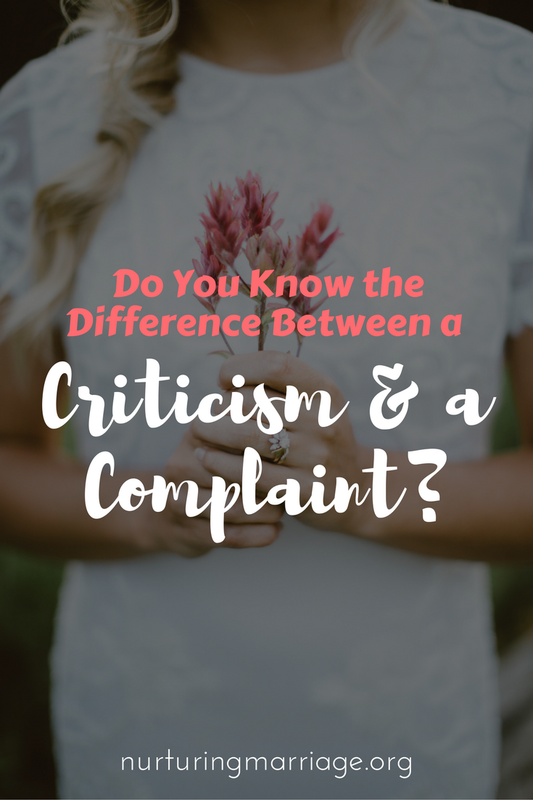|
Written by Crystal Bradshaw, LPC, NCC, Gottman 7 Principles Educator
Knowing the difference between a criticism and a complaint can improve your relationship. One of the most common issues couples bring up in session are complaints. Couples often interpret complaints as criticisms, as attacks. As a result they end up arguing over something that has nothing to do with the complaint, and the complaint is left unresolved and inevitability resurfaces again in the future.
Complaints and criticisms are often mistaken as one and the same, but they're not. There is a subtle difference that sets them apart, yet most people react to them the same way they do to a criticism. Knowing how to differentiate between them and how to respond instead of react, can alter the trajectory of a conflict for the better - bringing you and your partner closer instead of dividing you. So here is what you need to know about criticisms and complaints. A criticism is an attack on someone's character, it's a jab. It's made with the intention of hurting the other person and to inflict emotional pain. People respond to criticism by being defensive and often engaging in a counter-attack, or they simply shut down and withdraw. A complaint, on the other hand, is a request for a change in behavior. Complaints have a request within them, a need, a longing, a desire. If you can distinguish between a criticism and a complaint, hear the request within the complaint, and respond appropriately, then the emotional intimacy in your relationship will shift for the better. READ: AT LEAST TOUCH TOES! Most partners hear a complaint as a criticism, as an attack against them, so it's important to bring up a complaint at a neutral time and in a gentle tone. When you are on the receiving end of a complaint, it's important to learn how to filter what is actually being said, not what you think you are hearing. In my work with couples, I educate my clients on complaints so they can filter out the noise and focus their energy on hearing what their partner is saying. I want my clients to respond to their partners instead of reacting to them and becoming defensive with a counter-attack or shutting down. I want them to be able to have a dialogue about the issue, I don't want them talking at each other.
Complaining is an indirect attempt to bring up an issue of concern in the hope that it can be addressed. Complaints can come in a harsh or pleasant tone, and ideally you want to express yours in a gentle way.
Admittedly, many couples fail at executing this in a productive way. Here are 2 tips to remember when handling complaints - 1. Understand that a complaint is NOT a criticism. 2. Learn to listen for the request within the complaint and respond (don't react) to that. A complaint sounds like this: "I'm getting anxious and stressed over getting the house ready in time for the holiday party. Will you please help tackle some of this stuff?" Does that sound like a criticism? It's not. There are 4 key factors in this that make it a complaint and not a criticism. 1. It has an "I" statement, which the speaker is using to show ownership of how they are feeling. 2. The speaker is identifying a feeling/emotion that is contributing to and causing their emotional state (feeling anxious, and stressed). 3. The speaker is identifying what is behind their distress (getting the house ready in time for the holiday party) and is not blaming the partner for their emotional stress. 4. The speaker states a way they can feel better, and offers a positive way the partner can help (by helping get the house ready for the party).
The critical/criticism version of the above example would sound something like this: "You're stressing me out and making me anxious. You never help me get things ready. You're so lazy. You always leave the work to me." That is a criticism.
Phrases like: "You always", "You never" or name calling are signs that a criticism is being voiced. The speaker is attacking the partner and blaming the partner for their emotional state. Statements like this one escalate things. This is an attack, and when we feel attacked we get defensive, and when we are defensive we usually counter-attack or shut down. It's a natural response to defend and protect ourselves when we are attacked. When you come at your partner in a critical way and bring up things in a harsh tone, you can anticipate this reaction from them. READ: 3 SIMPLE WAYS TO CONNECT WITH YOUR SPOUSE How you present things makes a huge difference and can either set your partner up to react to you or respond to you. The ideal way to voice a complaint will have:
The goal is to get your partner to hear and respond non-defensively. Presenting your complaint in a gentle way and choosing your words carefully will create an environment for a response and not a reaction. You want your partner to respond to you, not react to you. Remember: Within every complaint there is a request, and it's important to be able to discern that request and not get caught up in the noise around it. Focus your energy on hearing what your partner is saying, or trying to say, and respond to that need. When your partner says: "Why don't you ever dress up for me?" they are not attacking you, they are saying: "Hey, I like it when you get dressed up and wish you would do it more often." Ideally, your partner would come out and say it like that, directly, but if you can learn to hear the request within the complaint you'll be able to meet, and anticipate, your partners needs and not get caught up in an unnecessary fight. If you are unable to correct the defensive reactions in your relationship, you may want to seek couples counseling to address the root issue. You can reach Crystal here, or check out her Facebook page here. Photo Credit: Ashley Swenson Photo
You may also enjoy So, You Married an Introvert? and How to Avoid Falling Out of Love - Part 1
2 Comments
SCOTT WYCOFF
6/14/2022 01:27:43 pm
Hi, did you know there are spells to win love back from an ex. I have done it. I love reading about relationships and how to make them work, how to better the relationship, and how to keep the spark alive, even how to talk to them a certain way to get them to think a different way about the situation and you. If you need advice or want to win your ex back, try DR EMU copy and message on the following ( Email: [email protected] ) or ( WhatsApp: +2347012841542 ) It will change your mentality and get you what you want. Facebook page Https://web.facebook.com/Emu-Temple- 104891335203341
Reply
Rachael Mildred
1/22/2024 09:13:21 am
EFFECTIVE LOVE SPELL TO GET EX HUSBAND/BOYFRIEND OR EX WIFE/GIRLFRIEND AND CURE HERPES AND INFERTILITY THAT WORKS WITHIN 24 HOURS.
Reply
Leave a Reply. |
Conflict
|


 RSS Feed
RSS Feed


